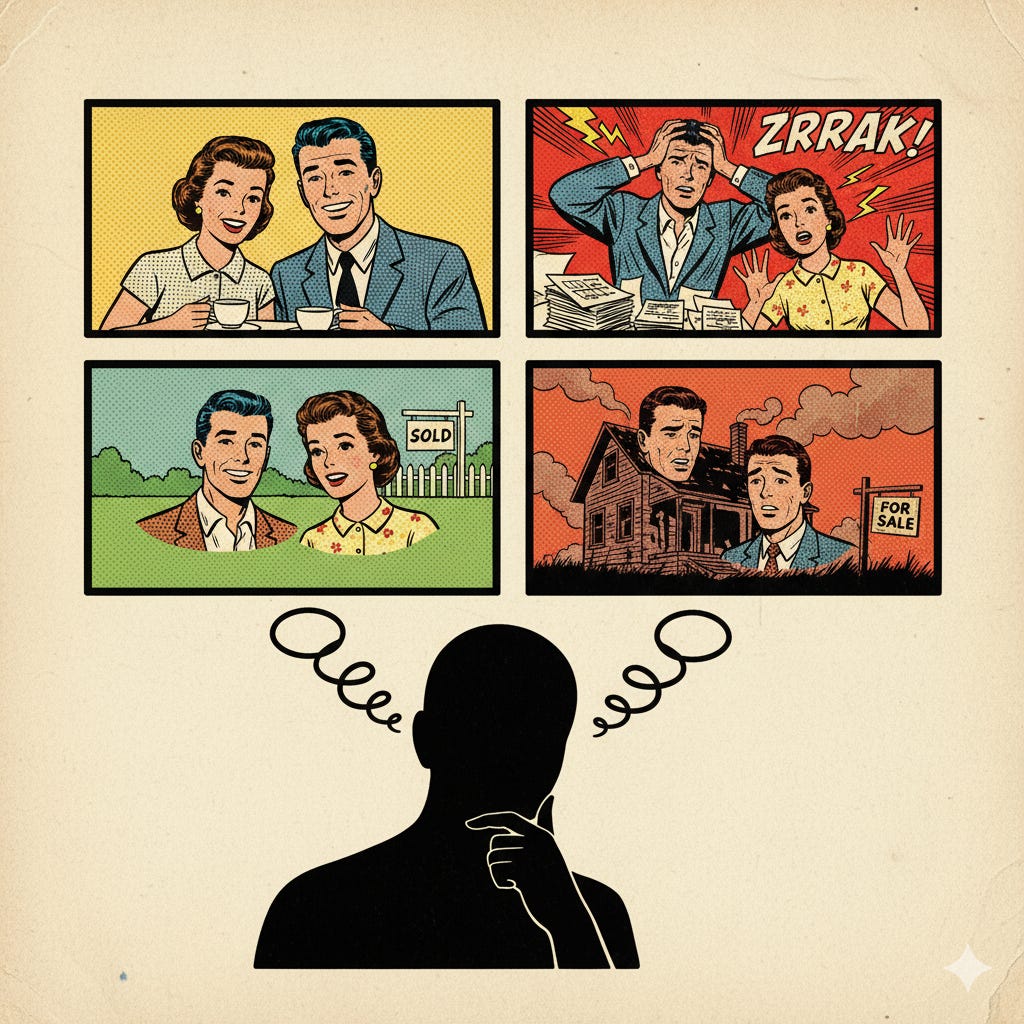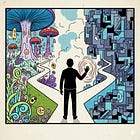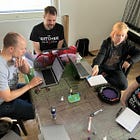Reality jumping: how to question your own beliefs
We're all the hero of our own story. It's a motivating phrase, but it's also a trap. Here’s why being the "hero" might be your biggest blind spot.
You can listen to this on the Tales under the cat tree podcast
We all live in our heads. Our minds make up the reality in which we find ourselves. It creates colours, feelings, sights, and sounds, and it ensures we remember our past, connect with our present, and imagine futures. So what happens when we realize the reality we live in is not what we had thought?
In my university days, there was a woman who a group of us considered a dear friend. She was witty, charming, outwardly beautiful, generous, and helpful. One semester, though, this person did not come to class. We received a note saying that she was sick, sadly with cancer, and in the hospital. Someone then decided to do the most obvious thing and sent a bouquet of flowers to the hospital in a fairly small town. From what I recall, the woman’s father received the note and flowers and forced his daughter to admit that she was not sick at all, and instead, all of it was an elaborate lie.
She had created a reality, we had created a reality, and when the realities collided, they could not be reconciled. Like matter and anti-matter meeting, all hell broke loose.
I am sure that you can find stories in your life where what you believed about someone turned out to be a false narrative. When it happens, we question our judgement; we look for the clues that could have revealed the truth. There are the partners who cheat on you, the friends who swore they would never do such a thing, and any number of other examples where you are left scratching your head. We spend a lot of time trying to understand why such an incongruity occurred, and often we mark it down to the person being crazy, evil, and/or otherwise deranged.
What is harder to do is to try and reconstruct the reality of the other person.
This is what we are trained to do as historians. In order to study the past, we need to put ourselves into the shoes of people and their reality. We need to become them, we need to believe in them, and we need to see the world from their point of view. To do that, we examine as much evidence as possible, and then we create hypothetical narratives. As you can imagine, and as I’m sure you have yourself done, you realize that all realities you create which are not your own, even when based on evidence, are a form of fiction open to being challenged. When the evidence is convincing enough, the narrative comes close to resembling what we all objectively agree is “the truth.”
What is even harder than reconstructing a reality of another person is to deconstruct the reality that you create for yourself.
There is the expression that you are the hero of your own story. In most cases, this is a motivational phrase to note that you control your own destiny, that you can manifest the change that you seek. For me, this is also one of the reasons why there is so much conflict in the world. You are the hero of your narrative. You are not a bad person, you are never someone who is evil, and you would never want to intentionally hurt someone. But we all sometimes do, whether we know it or not. If you can deconstruct your own reality and ask yourself, “What if what I believe about me is wrong?” then you have a very powerful way of examining the world around you and how you move through the reality that you weave about you.
Anyone suffering from so-called “imposter syndrome” is likely shouting, “Isn’t that what I do all the time?” I would argue instead that even saying you have “imposter syndrome” is a reality that you create for yourself; it allows you the freedom to get something wrong (”Well, obviously I didn’t know; I wasn’t supposed to know”) or extra kudos to yourself when you get something right (”Well, look at me, I’m so awesome; I wasn’t supposed to know”). By being able to step outside your reality and examine yourself from different points of view, you can start to understand and correct the vision of you that lives in someone else’s reality.
I will give you a very basic example. You are an expert in software packages A, B, and C. Whenever someone asks about a piece of software, you respond immediately. One day there’s a promotion and you are not considered. You get very mad; the person they gave it to only knows software packages A and C. In this very simplistic example: in one version of the reality you have created, it is likely that the manager is terrible and you find ways to leave the job. Another version of the reality may come from realizing the manager only ever saw you respond about software package B and assumed, wrongly, that you didn’t know A and C.
Admittedly, there’s more than these two sets of realities in this example, but you get the general picture. The stories we tell ourselves fuel the narratives with which we live our lives. For those seeking to truly create change around them, you must question how accurate the reality you have constructed is and also seek to understand the various realities others find themselves in.
Here are some ways that I try to practice jumping into other realities:
Read and write fiction. The ability for us to embody and live the lives of others is one of the most powerful things you can do.
Play tabletop roleplaying games. Playing games allows you to try out new ways of thinking, and while you might be playing in a fictional world, this will give you lots of ways to try out ideas.
Turn the tables on some basic idea in your life. Imagine that something basic in how you perceive yourself is not correct and examine your interactions from that point of view.
When someone gives you a compliment or a criticism, instead of playing the hero or the victim, really examine why this happened and what about you caused that to happen.
Today, you can ask your friendly AI (ChatGPT, Gemini or Claude for example), how you might want to think about things in a lateral way.
In my personal opinion, the cornerstone of creative or “lateral” thinking begins with the ability to jump into another reality. Remember, what we perceive as reality is a bunch of light hitting our retinas, creating electronic signals which are then smoothed over by our brain into a movie that is played out in our head. Given different pieces of information, your brain will absolutely create a different reality. The best we can do is to fight with the realities that we think we are living in, so that our combined reality is more harmonious, understanding, and filled with joy.
Related articles:





This article comes at the perfect time, realy. Your point about realities colliding is so true. It makes me wonder, how do we even begin to debug our internal algorithms for reality once they're so deeply nested? It's like a system crash on a personal level.
Lots of food for thought. Thanks Dups